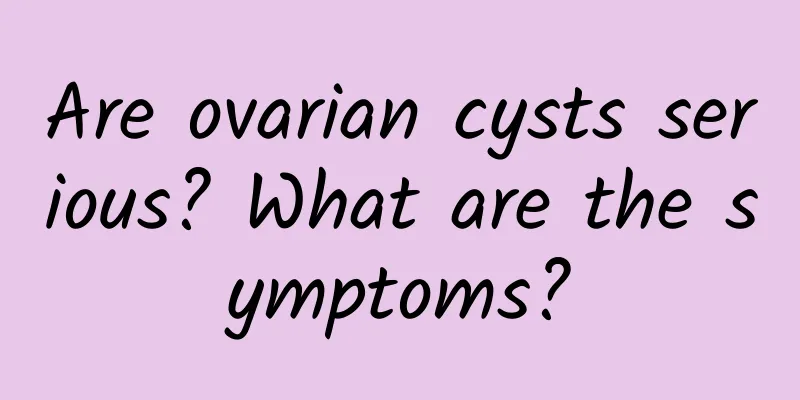Are ovarian cysts serious? What are the symptoms?

|
Ovarian cysts are a gynecological disease that has a great impact on women. They often occur in women of childbearing age and may become malignant. So are ovarian cysts serious? What are the symptoms? Ovarian cysts are quite serious and patients need timely treatment. Patients usually have no obvious symptoms and are often discovered accidentally during physical examinations. Clinically, the disease progresses slowly. As the cyst slowly increases, there are often symptoms such as menstrual disorders, abdominal distension and abdominal pain. When these symptoms are more serious, women are more likely to suffer from ovarian cysts, and the chance and harm of ovarian cancer are greater if the lesion is malignant. The main symptoms of ovarian cysts are: Patients feel that their abdominal circumference has increased and they can feel a mass in the lower abdomen, which is especially noticeable in the morning when they hold their urine and may disappear after urination. Occasionally, they may experience back pain and abdominal distension, and may urinate frequently, but without urinary pain, urgency, or constipation. If the ovarian cyst pedicle is twisted or ruptured, it will manifest as acute abdominal pain, which is a common acute abdomen in clinical visits. Ovarian cyst is a serious gynecological disease. Patients should be treated promptly. The following drugs can be used: Xiaojie'an Capsule: Tongselesailong, Bingnonggannongnei Nongjie, Hunbingnei, Bingban. Traditional Chinese Medicine: Activate blood circulation and remove blood stasis, soften and disperse nodules. Used for breast lumps caused by qi stagnation and blood stasis, breast lobular hyperplasia, ovarian cysts, and uterine fibroids with the above symptoms. Hongjin Xiaojie Capsule: Formerly known as Amonoqi Capsule and Xiaorupi Capsule. The prescription of this medicine is a secret recipe of Yunnan Yi people and is a national secret variety. Guizhi Fuling Capsule: It is a compound preparation made from five Chinese medicinal herbs: cinnamon twig, poria, peony bark, peach kernel, and peony root. It is clinically used for gynecological diseases. |
<<: How to prevent recurrence of adnexitis
>>: What causes pelvic inflammatory disease in women?
Recommend
What drugs are good for treating cervical erosion? Patients with cervical erosion can try taking these drugs
Now more and more women have various cervical ero...
Can vulvar leukoplakia be cured?
Can vulvar leukoplakia be cured? Although we are ...
What are the causes of uterine fibroids? Can multiple miscarriages also cause uterine fibroids?
Uterine fibroids are one of the most common benig...
Is miscarriage hereditary? Try to avoid miscarriage
Abortion is not a hereditary disease and will not...
How harmful is ectopic pregnancy at 47 days?
Ectopic pregnancy refers to a situation where we ...
Menstrual irregularities caused by ovarian problems are more common
Irregular menstruation caused by ovarian problems...
Describe the early symptoms of ectopic pregnancy
Ectopic pregnancy is a common symptom during preg...
What tests are done to diagnose sinus atresia?
The diagnosis of sinus atresia requires a combina...
What does nursing care for patients with uterine effusion include?
The occurrence of uterine effusion brings great i...
Combination of Chinese and Western medicine in treating pelvic peritonitis
There are more and more gynecological diseases in...
How are uterine fibroids caused?
Uterine fibroids may be caused by genetic factors...
What should I not eat after having an abortion? What should I eat after having an abortion?
What should I not eat after having an abortion? W...
Several common symptoms of vaginal candidiasis
It is understood that many female friends suffer ...
Do you know what are the causes of dysmenorrhea?
Most women nowadays will experience dysmenorrhea,...
Why is menopause difficult to cure?
Many women have to experience menarche and menopa...









